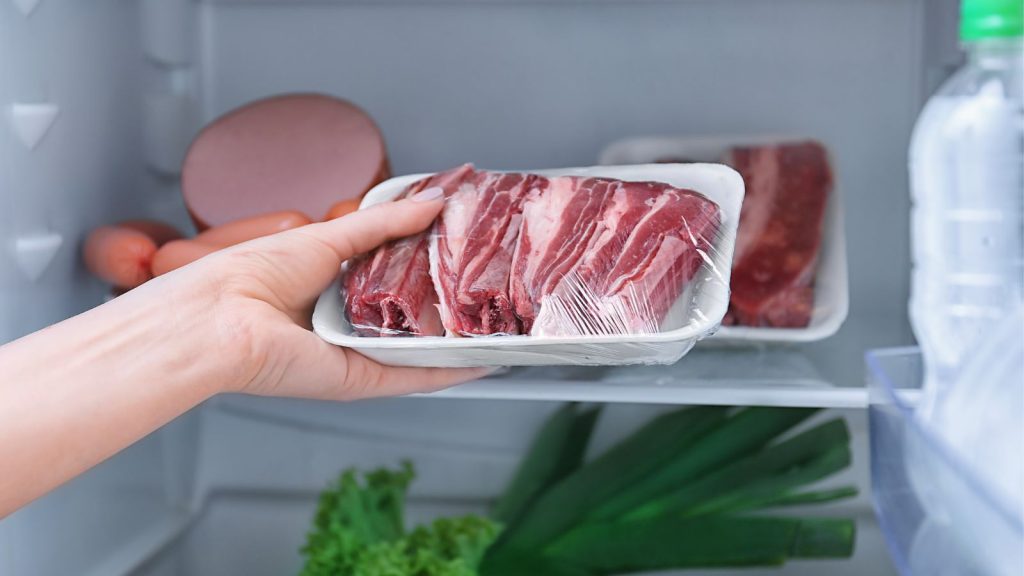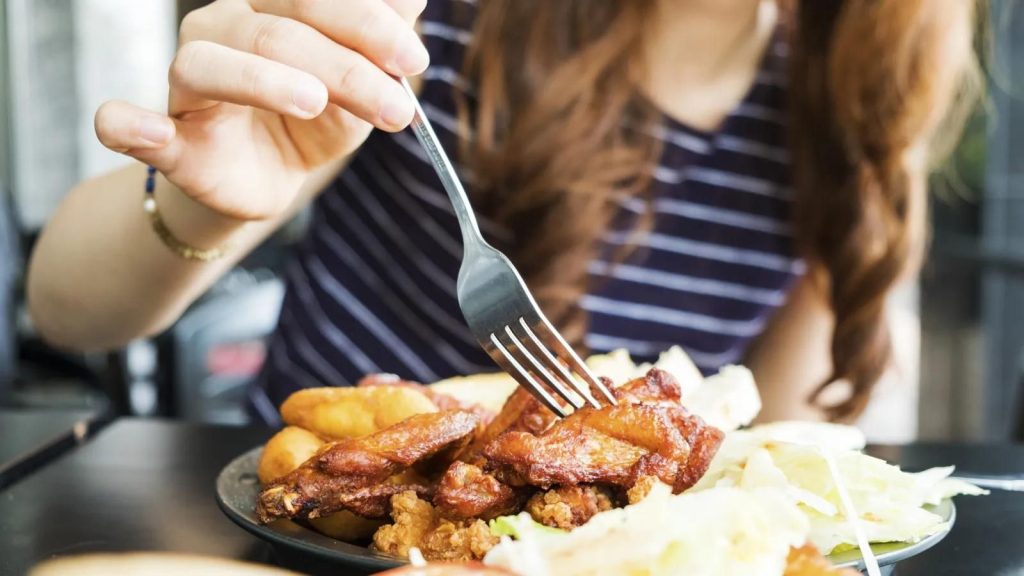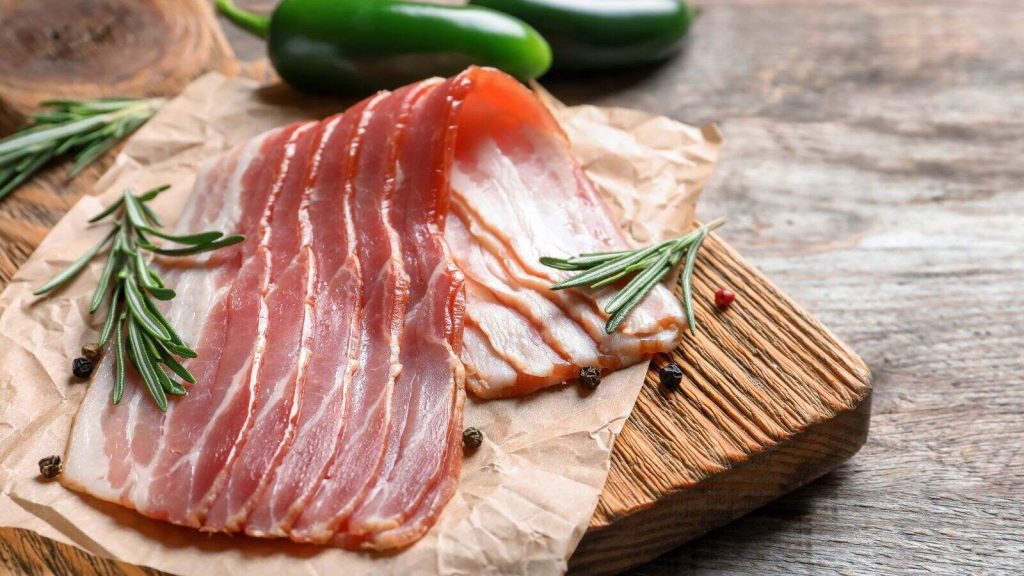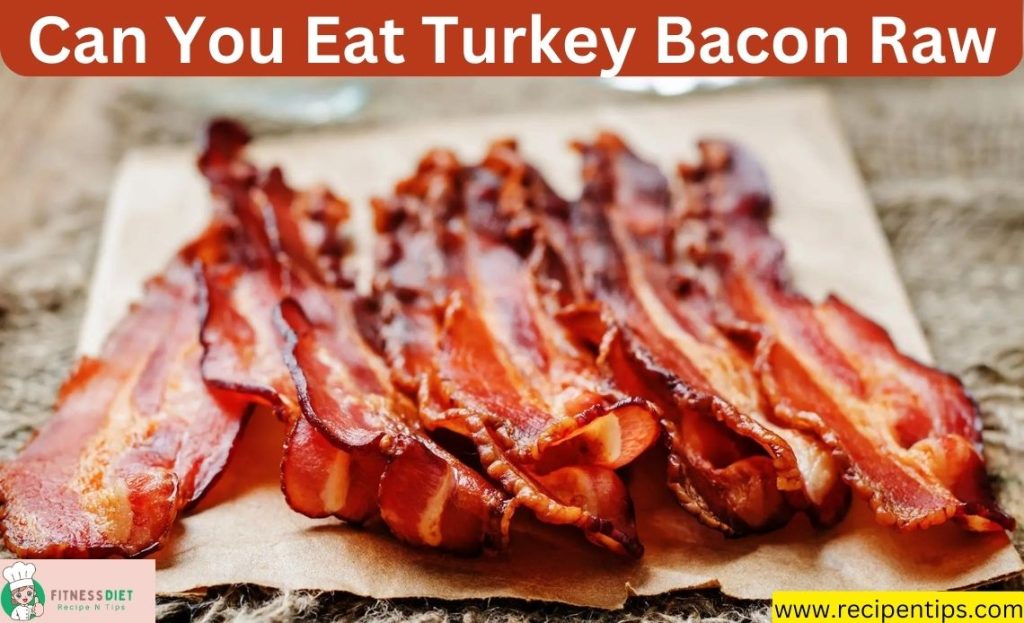Turkey bacon is becoming increasingly popular amongst health-conscious foodies and home cooks alike. It contains significantly less fat and calories than pork bacon. It makes it a healthier option if you’re watching your waistline.
Plus, the taste of turkey bacon can be just as delicious as regular pork bacon – without all the guilt! But this begs the question:
Can you eat turkey bacon raw? Is it safe to do so, or should you always cook it before eating? Read on to find out more about this flavorful meat and its safety considerations when consumed raw.
What is Raw Turkey Bacon and Is It Safe to Eat
Raw turkey bacon can be a tasty and savory addition to breakfast. Generally speaking, the answer is no; because turkey bacon is much leaner than traditional pork bacon.
It can not be thoroughly cooked without taking on an unappetizing texture, and it can contain bacteria that can make you sick if not cooked properly.
As such, even though it may be tempting, it is important to follow proper safety procedures when preparing raw turkey bacon or else avoid it.
Ways to Prepare and Cook Raw Turkey Bacon
- Preheat oven to 375 degrees F.
- Cut bacon strips into small pieces.
- Spread bacon pieces on a baking sheet.
- Bake for 15-20 minutes or until bacon is crisp.
- Remove from oven and let cool.
- Crumble bacon and set aside.
- Preheat a skillet over medium heat.
- Add turkey to the skillet and cook for 5-7 minutes per side, or until cooked through.
- Remove from heat and let cool slightly.
- Chop turkey into small pieces.
- In a bowl, mix turkey, bacon, and desired seasonings.
- Serve as is or use it as a filling for tacos, burritos, or sandwiches.
Tips for Storing Raw Turkey Bacon Properly

1. Keep it cool.
Raw turkey bacon should be stored in the refrigerator at 40°F or below. This will help to keep the meat fresh and prevent the growth of harmful bacteria.
2. Use within 2 days.
Raw turkey bacon should be used within 2 days of being purchased. If you are not using it within this time frame, you can freeze it for up to 2 months.
3. Wrap it up.
Raw turkey bacon should be wrapped in plastic wrap or placed in a resealable bag before being stored in the refrigerator. This will help to keep it fresh and prevent it from drying out.
4. Keep it dry.
Raw turkey bacon should be stored in a dry location in the refrigerator. This will help to prevent the growth of bacteria and mold.
5. Do not wash before cooking.
You should not wash raw turkey bacon before cooking it, as this can increase the risk of cross-contamination. Washing the meat will also remove any protective barrier that may help to keep it fresh.
6. Cook thoroughly.
Raw turkey bacon must be cooked thoroughly to ensure that any harmful bacteria are killed. The meat should be cooked to an internal temperature of 165°F before consumption.
Potential Risks of Eating Undercooked or Uncooked Turkey Bacon

1. Listeria
Listeria is a type of bacteria that can cause food poisoning. Symptoms of listeria poisoning include fever, diarrhea, and vomiting. In severe cases, listeria can lead to septicemia, a potentially fatal infection of the blood.
2. Salmonella
Salmonella is another type of bacteria that can cause food poisoning. Symptoms of salmonella poisoning include fever, diarrhea, and vomiting. In severe cases, salmonella can lead to septicemia, a potentially fatal infection of the blood.
3. E. coli
E. coli is a type of bacteria that can cause food poisoning. Symptoms of E. coli poisoning include fever, diarrhea, and vomiting. In severe cases, E. coli can lead to septicemia, a potentially fatal infection of the blood.
4. Campylobacter
Campylobacter is a type of bacteria that can cause food poisoning. Symptoms of campylobacter poisoning include fever, diarrhea, and vomiting. In severe cases, campylobacter can lead to septicemia, a potentially fatal infection of the blood.
5. Staphylococcus aureus
Staphylococcus aureus is a type of bacteria that can cause food poisoning. Symptoms of staphylococcus aureus poisoning include fever, diarrhea, and vomiting. In severe cases, staphylococcus aureus can lead to septicemia, a potentially fatal infection of the blood.
7. Clostridium botulinum
Clostridium botulinum is a type of bacteria that can cause food poisoning. Symptoms of clostridium botulinum poisoning include fever, diarrhea, and vomiting.
In severe cases, clostridium botulinum can lead to septicemia, a potentially fatal infection of the blood.
The Health Benefits of Eating Cooked Turkey Bacon

1. Fewer Calories
Cooked turkey bacon contains fewer calories than pork bacon. A 3-ounce serving of cooked pork bacon contains about 270 calories, while a 3-ounce serving of cooked turkey bacon contains about 140 calories.
This difference in calorie content can be attributed to the fact that turkey bacon is lower in fat than pork bacon.
2. Lower Fat Content
As mentioned above, turkey bacon has a lower fat content than pork bacon. A 3-ounce serving of cooked pork bacon contains about 17 grams of fat, while a 3-ounce serving of cooked turkey bacon contains about 5 grams of fat.
This difference in fat content can help to reduce your overall intake of saturated and trans fats, which are linked to an increased risk of heart disease.
3. Lower Sodium Content
Turkey bacon also has a lower sodium content than pork bacon. A 3-ounce serving of cooked pork bacon contains about 710 milligrams of sodium, while a 3-ounce serving of cooked turkey bacon contains about 480 milligrams of sodium.
This difference in sodium content can help to reduce your risk of high blood pressure and other health problems associated with excess sodium intake.
4. Higher Protein Content
While turkey bacon does have less fat than pork bacon, it actually has a higher protein content. A 3-ounce serving of cooked pork bacon contains about 12 grams of protein, while a 3-ounce serving of cooked turkey bacon contains about 18 grams of protein.
This difference in protein content can help to increase satiety and reduce your overall intake of calories.
5. Contains B Vitamins
Turkey bacon is also a good source of several B vitamins, including thiamin, riboflavin, niacin, and vitamin B6. These vitamins are important for energy metabolism, cell growth and development, and nervous system function.
6. Contains Selenium
Turkey bacon is also a good source of selenium, a mineral that plays a role in thyroid hormone metabolism and immune system function.
Selenium deficiency has been linked to an increased risk of several health problems, including Hashimoto’s disease, Graves’ disease, and certain types of cancer.
7 . It May Help to Reduce the Risk of Cancer
Several studies have shown that consuming processed meats like turkey Bacon may increase the risk of certain types of cancer, including colorectal cancer and pancreatic cancer.
However, it should be noted that these studies have largely been conducted on populations with high intakes of processed meats (i.e., more than 2 servings per week).
Additionally, many of these studies did not account for other potential cancer risk factors, such as smoking status and family history.
FAQS on can you eat turkey bacon raw

1. Is turkey bacon safe to eat raw?
No, you should not eat turkey bacon raw. Turkey bacon is made from ground turkey meat that has been cured, smoked, and seasoned. It is safe to eat when cooked to an internal temperature of 165 degrees Fahrenheit, but it is not safe to eat raw.
2. What are the health benefits of eating turkey bacon?
Turkey bacon is a leaner and healthier alternative to pork bacon. It is lower in calories, fat, and saturated fat than pork bacon. Additionally, turkey bacon contains no nitrates or nitrites.
3. How do I cook turkey bacon?
You can cook turkey bacon in a skillet on the stovetop, in the oven, or in the microwave. To cook it on the stovetop, simply add it to a cold skillet and cook over medium heat until crisp.
To cook it in the oven, preheat the oven to 400 degrees Fahrenheit and bake for 10-12 minutes. To cook it in the microwave, place it on a paper towel-lined plate and cook for 1-2 minutes on high power.
4. How long does cooked turkey bacon last in the fridge?
Cooked turkey bacon will last in the fridge for up to 3 days. Be sure to store it in an airtight container or baggie to keep it fresh.
5. Can you freeze cooked turkey bacon?
Yes, you can freeze cooked turkey bacon. Place it in a freezer-safe container or baggie and store it in the freezer for up to 2 months. When you’re ready to eat it, simply thaw it overnight in the fridge and reheat it as desired.
6. What are some recipes that include turkey bacon?
Many recipes include turkey bacon! Here are a few of our favorites: Turkey Bacon Wrapped Dates, Turkey Bacon Avocado Egg Salad, Turkey Bacon Brussels Sprouts Hash, and BLT Turkey Bacon Wraps.
7. Can you use turkey bacon instead of pork bacon?
Yes, you can use turkey bacon instead of pork bacon in most recipes. However, keep in mind that it will cook differently than pork bacon due to its lower fat content. You may need to adjust your cooking time accordingly.
Final Thoughts on Can You Eat Turkey Bacon Raw-Is It Safe
To ensure safety and quality, thorough cooking is strongly advised when consuming any type of poultry or pork product. Similarly, make sure your turkey bacon is kept refrigerated until needed – ideally no longer than a few days.
Ultimately regardless of if you can eat turkey bacon raw or not, these steps and considerations can help provide an extra layer of peace of mind.



